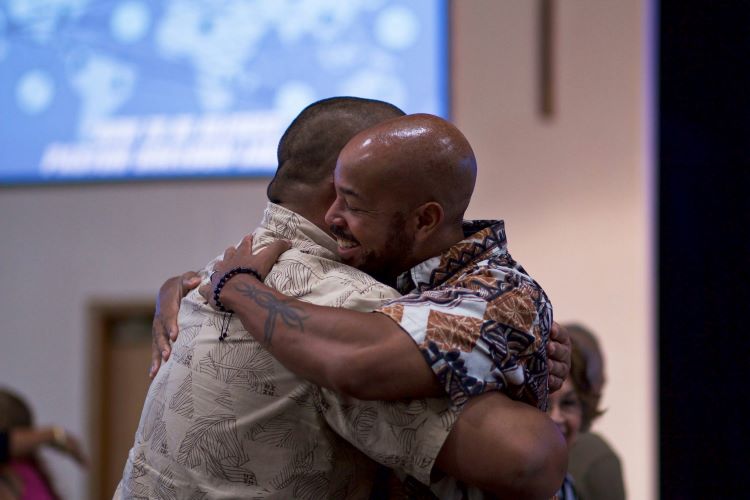Quick links for Alcoholics Anonymous
- What occurs at an Alcoholics Anonymous meeting?
- Types of Alcoholics Anonymous meetings?
- What does it mean to have an Alcoholics Anonymous sponsor?
- Barriers to going to an Alcoholics Anonymous meeting
- Where did Alcoholics Anonymous come from?
- Is Alcoholics Anonymous a religious group?
- What are the 12 Steps of Alcoholics Anonymous?
- Final Thoughts: Will Alcoholics Anonymous suit you?
Alcoholics Anonymous meetings support millions of people throughout the world towards and in maintaining a life of abstinence.
AA is very effective at providing one of the most important factors that enable recovery: social connection.
It might feel a little daunting to find out what Alcoholics Anonymous is all about.
Understanding the basis for AA meetings can make the first step easier.
There are Alcoholics Anonymous groups that meet throughout the UK. OK Rehab can guide you through your local options if you’re interested in knowing more.
What occurs at an Alcoholics Anonymous meeting?

People gathered for an Alcoholics Anonymous meeting
An AA meeting is a space where people come together to share their experiences of alcoholism. For those who have never been, this might feel scary or off-putting.
However, the way the group is facilitated ensures that people are comfortable and feel no pressure to share unless they want to.
Addiction to alcohol has widespread effects throughout all areas of a person’s life. The physical and psychological self has been damaged as well as the harm it inflicts on relationships.
At a meeting, AA members are invited to talk about how they’re feeling and how alcohol addiction is impacting their lives.
There are times when people offer each other support and advice. AA meetings provide an opportunity for people to connect to others who are living with similar addiction problems.
The social aspect of AA is very beneficial in aiding recovery. Research shows that positive social connection improves chances of recovery. (1)
There are guidelines that govern AA meetings. This is to make sure that attendees feel confident and comfortable.
Although people are invited to share, there is no pressure to. It’s made clear that people don’t have to identify themselves by giving their name at the start of sessions – hence the name ‘Anonymous’.
The focus of AA is that people are seeking a life of abstinence. Importantly. The only eligibility for going to AA meetings is wanting to stop drinking.
Types of Alcoholics Anonymous meetings

Man talking to a circle of recoverees at an Alcoholics Anonymous meeting
There are different types of AA meetings in terms of who is invited to attend and also the structure the meetings take.
Alcoholics Anonymous: Open meetings
Open meetings are AA meetings where anyone is welcome to attend. Both people living with alcohol addiction as well as people who aren’t.
If a person invites a family member to a meeting who doesn’t have a drinking problem, they would be invited to an open meeting.
Open meetings are a great space to share the experience of alcoholism with family members and friends. It’s a safe environment to talk about the reality of being addicted and provides a place where this can be shared with loved ones.
Alcoholics Anonymous: Closed meetings
Closed meetings at Alcoholics Anonymous are where only those with alcohol problems attend. It’s also open to those who are thinking about ways to quit alcohol and start a sober lifestyle.
The 12-steps in Alcoholics Anonymous
AA meetings sometimes focus purely on the 12 Steps. It might be one of the steps in particular.
AA members will think about their experience of alcoholism in relation to one of the steps and will share this with the group if they want to.
12-step meetings tend to take the format of being closed. (The 12 Steps are mentioned later in the article.)

Patient and advisor discussing Alcoholics Anonymous
Speaking and Listening at Alcoholics Anonymous
This is probably the type of AA meeting most people think about when they imagine AA. People are given the space to talk about their addiction and how their recovery is going, whilst other members listen.
These meetings are often open. This can be a good meeting for someone to attend for the first time.
Interactive AND Discussion-based Alcoholics Anonymous meetings
An interactive and discussion-based AA meeting is where one member might facilitate the meeting. It could start with the person sharing an experience and opening up a topic of discussion for people to share their stories and ideas.
These meetings will sometimes be closed, sometimes open.
What does it mean to have an Alcoholics Anonymous sponsor?

Person holding hands with their Alcoholics Anonymous sponsor
An AA sponsor is someone who connects another person to Alcoholics Anonymous and helps to support them in their recovery journey.
This relationship can be extremely efficient in how it provides a social connection.
It’s a relationship that is supportive.
An AA sponsor will be further along with the 12 Steps than the person who has just joined and will act as a support point. They will share their experiences with the person they are sponsoring.
This relationship also takes place outside of AA meetings. Sometimes a person and their sponsor might speak over the phone or meet for coffee.
This relationship can be very effective in supporting a person around cravings and in the event of relapse.
Barriers to going to an Alcoholics Anonymous meeting

People sat together and smiling during an Alcoholics Anonymous meeting
Accessing treatment for an addiction is a huge step. As with anything a person faces that feels challenging, they might think of excuses to avoid the situation.
One of the main traits needed to achieve a life of sobriety is the ability to be honest with oneself. This means thinking honestly about the excuse and trying to think about its opposite.
For example, a person might think their drink problem isn’t “that bad” when it is in fact extremely serious.
Addiction and alcoholism often come with a stigma. People might deny they have a problem or try and tell themselves they “aren’t as bad as others”.
In this case, it can be helpful to consider what a “bad drink problem” means.
If the following situations exist then a person would benefit from thinking honestly about the severity of the addiction they suffer from:
- Drinking as often as you can.
- Thinking about/wanting to drink every day.
- Needing to drink to prevent withdrawal symptoms
- Physical impact or damage
- Deterioration of mental health (i.e. low mood, anxiety)
- Change in behaviours and motivation to do things that don’t involve drinking
- Concern from people close to you about your drinking habits
- The strain on relationships
- Financial difficulties (2)
- Problems at work
Questioning the effectiveness of Alcoholics Anonymous
It’s healthy to question, especially in terms of making an important decision.
However, it’s also important to seek answers from many sources.
The best place to find out if AA works is by speaking with other people who actually go and the ultimate way is to try a few meetings for yourself.
Knowing other people when you go in to Alcoholics Anonymous
Sometimes, when a person goes to AA they will see somebody they know. This might come as a surprise.
In this instance, it’s important to remember that everyone is there for the same reason.
There is no shame in seeking help to recover from an illness.
Is Alcoholics Anonymous a religious group?
Many people think that AA is a religious group. This can be very off-putting for those who aren’t religious and for those who follow a specific religion.
Alcoholics Anonymous isn’t a religious group, although it is a faith-based group.
To follow the 12 Steps a person needs to have a sense of a “higher power”.
This doesn’t necessarily mean God or a god.
To understand more about what this means, it’s helpful to understand more about the origins of AA.
Where did Alcoholics Anonymous come from?

Two men hugging at an Alcoholics Anonymous meeting
Alcoholics Anonymous was founded in the 1930s by Bill Wilson and Dr Bob Smith. Both had severe alcohol problems.
The two formed the AA group to support alcoholics in the community.
Within this group they developed the 12 Steps. This outlined how a person would focus on their road to recovery and healing.
Is Alcoholics Anonymous a religious group?

Two people talking about Alcoholics Anonymous
Alcoholics Anonymous isn’t religious, although some people might refer to god or a higher power within the meetings.
When it was founded some members were agnostic, which is why the term “higher power” is used.
This higher power is defined as whatever the individual puts faith into in order to gain strength or purpose.
It might be God for some, or it might be nature or the universe for others.
AA is a faith-based rather than religious-based group. There are, however, religious 12-step groups as well.
In the UK, AA groups accessed at drug and alcohol clinics are predominantly faith-based.
What are the 12 Steps of Alcoholics Anonymous?

People gathering for an Alcoholics Anonymous meeting
The 12 Steps of Alcoholics Anonymous are:
- We admitted we were powerless over alcohol – that our lives had become unmanageable.
- Came to believe that a Power greater than ourselves could restore us to sanity.
- Made a decision to turn our will and our lives over to the care of God as we understood Him.
- Made a searching and fearless moral inventory of ourselves.
- Admitted to God, to ourselves and to another human being the exact nature of our wrongs.
- Were entirely ready to have God remove all these defects of character.
- Humbly asked Him to remove our shortcomings.
- Made a list of all persons we had harmed and became willing to make amends to them all.
- Made direct amends to such people wherever possible, except when to do so would injure them or others.
- Continued to take personal inventory and when we were wrong promptly admitted it.
- Sought through prayer and meditation to improve our conscious contact with God as we understood Him, praying only for knowledge of His will for us and the power to carry that out.
- Having had a spiritual awakening as the result of these steps, we tried to carry this message to alcoholics and to practice these principles in all our affairs.
Final Thoughts: Will Alcoholics Anonymous suit you?

Recoveree and sponsor talking about Alcoholics Anonymous
Alcoholics Anonymous has supported millions of people to achieve and maintain a healthy life of sobriety. Research supports that AA is one of the most effective ways to achieve alcohol abstinence. (3)
The best way to find out is to try the approach for yourself and to make your own decision. As with anything, it’s advisable to go more than once as the dynamics and focus of the group will change according to the format and participants.
Attending a few times will give you a better understanding of whether it will suit you.
There are also many other types of treatment you can access for alcohol addiction. Physical and psychological treatments along with groups therapies provide a fully comprehensive and solid approach to recovery.
To find out where your local Alcoholics Anonymous groups are, contact OK Rehab.
One of our friendly advisors will guide you through what treatments and groups are available in your area.






